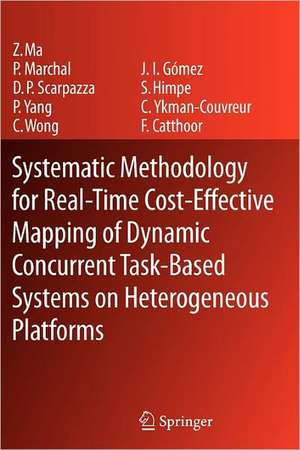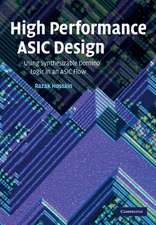Systematic Methodology for Real-Time Cost-Effective Mapping of Dynamic Concurrent Task-Based Systems on Heterogenous Platforms
Autor Zhe Ma, Pol Marchal, Daniele Paolo Scarpazza, Peng Yang, Chun Wong, José Ignacio Gómez, Stefaan Himpe, Chantal Ykman-Couvreur, Francky Catthooren Limba Engleză Paperback – 19 oct 2010
| Toate formatele și edițiile | Preț | Express |
|---|---|---|
| Paperback (1) | 639.59 lei 43-57 zile | |
| SPRINGER NETHERLANDS – 19 oct 2010 | 639.59 lei 43-57 zile | |
| Hardback (1) | 645.79 lei 43-57 zile | |
| SPRINGER NETHERLANDS – 9 iul 2007 | 645.79 lei 43-57 zile |
Preț: 639.59 lei
Preț vechi: 752.45 lei
-15% Nou
Puncte Express: 959
Preț estimativ în valută:
122.40€ • 127.01$ • 102.30£
122.40€ • 127.01$ • 102.30£
Carte tipărită la comandă
Livrare economică 17-31 martie
Preluare comenzi: 021 569.72.76
Specificații
ISBN-13: 9789048176106
ISBN-10: 9048176107
Pagini: 276
Ilustrații: XII, 264 p.
Dimensiuni: 155 x 235 x 14 mm
Greutate: 0.4 kg
Ediția:Softcover reprint of hardcover 1st ed. 2007
Editura: SPRINGER NETHERLANDS
Colecția Springer
Locul publicării:Dordrecht, Netherlands
ISBN-10: 9048176107
Pagini: 276
Ilustrații: XII, 264 p.
Dimensiuni: 155 x 235 x 14 mm
Greutate: 0.4 kg
Ediția:Softcover reprint of hardcover 1st ed. 2007
Editura: SPRINGER NETHERLANDS
Colecția Springer
Locul publicării:Dordrecht, Netherlands
Public țintă
ResearchCuprins
Related Work.- System Model and Work Flow.- Basic Design-Time Scheduling.- Scalable Design-Time Scheduling.- Fast and Scalable Run-time Scheduling.- Handling of Multidimensional Pareto Curves.- Run-Time Software Multithreading.- Fast Source-level Performance Estimation.- Handling of Task-Level Data Communication and Storage.- Demonstration on Heterogeneous Multiprocessor SoCs.- Conclusions and future research work.
Notă biografică
Francky Catthoor is a leading researcher at IMEC and is very well established within the EDA community. He is IEEE Fellow and has edited and authored 6 books for Springer/Kluwer.
Textul de pe ultima copertă
Systematic Methodology for Real-Time Cost-Effective Mapping of Dynamic Concurrent Task-Based Systems on Heterogeneous Platforms gives an overview of the state-of-the-art in system-level design trade-off explorations for concurrent tasks running on embedded heterogeneous multiple processors. The targeted application domain covers complex embedded real-time multi-media and communication applications.
Many of these applications are concurrent in the sense that multiple subsystems can be running simultaneously. Also, these applications are so dynamic at run-time that the designs based on the worst case execution times are inefficient in terms of resource allocation (e.g., energy budgets). A novel systematical approach is clearly necessary in the area of system-level design for the embedded systems where those concurrent and dynamic applications are mapped. This material is mainly based on research at IMEC and its international university network partners in this area in the period 1997-2006. In order to deal with the concurrent and dynamic behaviors in an energy-performance optimal way, we have adopted a hierarchical system model (i.e., the gray-box model) that can both exhibit the sufficient detail of the applications for design-time analysis and hide unnecessary detail for a low-overhead run-time management. We have also developed a well-balanced design-time/run-time combined task scheduling methodology to explore the trade-off space at design-time and efficiently handle the system adaptations at run-time. Moreover, we have identified the connection between task-level memory/communication management and task scheduling and illustrated how to perform the task-level memory/communication management in order to obtain the design constraints that enable the this connection. A fast approach is also shown to estimate at the system-level, the energy and performance characterization of applications executing on the target platform processors.
Many of these applications are concurrent in the sense that multiple subsystems can be running simultaneously. Also, these applications are so dynamic at run-time that the designs based on the worst case execution times are inefficient in terms of resource allocation (e.g., energy budgets). A novel systematical approach is clearly necessary in the area of system-level design for the embedded systems where those concurrent and dynamic applications are mapped. This material is mainly based on research at IMEC and its international university network partners in this area in the period 1997-2006. In order to deal with the concurrent and dynamic behaviors in an energy-performance optimal way, we have adopted a hierarchical system model (i.e., the gray-box model) that can both exhibit the sufficient detail of the applications for design-time analysis and hide unnecessary detail for a low-overhead run-time management. We have also developed a well-balanced design-time/run-time combined task scheduling methodology to explore the trade-off space at design-time and efficiently handle the system adaptations at run-time. Moreover, we have identified the connection between task-level memory/communication management and task scheduling and illustrated how to perform the task-level memory/communication management in order to obtain the design constraints that enable the this connection. A fast approach is also shown to estimate at the system-level, the energy and performance characterization of applications executing on the target platform processors.
Caracteristici
The first addressing the low-power design by doing system-level trade-offs of (dynamic concurrent) task scheduling which does not fully depend on Dynamic Voltage Scaling (DVS) or Dynamic Power management (DPM) Highlights a set of solid system synthesis techniques that have been partly verified with realistic demonstrators and that are also supported in our prototype tools Together with the connection between embedded memory and processor, these features make our book different from other books in the processor mapping area With the rapidly increasing interest in (portable) system designs based on multiprocessor SoC platforms where energy-aware real-time signal processing is a must, we believe a clear market for this type of system exploration methodology exists












